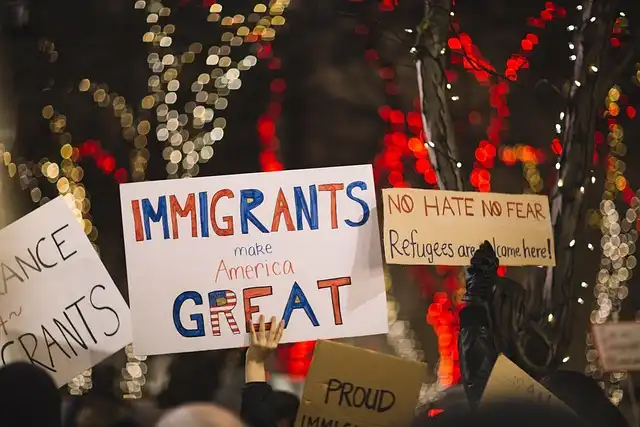Immigration, Activism, and Due Process: Then and Now

Comparing immigration suppression tactics of the 1980s (LA 8) and today, highlighting concerns about due process, national-security arguments, and parallels with past eras of prejudice and government overreach. Key issues: activism, deportation.
I believe the difference is that the government after that was playing by the policies. They were supplying the individuals with opportunities to oppose their deportation or criminal costs against them via the typical judicial procedure.
The Reagan Era and Combating Terrorism
It was a time when the Reagan management had decided that they needed to end up being really aggressive in combating terrorism. The exec order developed a task force to root out the terrorist advocates inside the United States.
Back in the day, immigration law was kind of a dark edge of lawful education and learning. There are various other darker periods in U.S. history where the government made use of immigration legislations to manage individuals.
Trump Administration: Immigration and Due Process Concerns
The crucial difference in between the migration suppression in the 1980s and today, Banks stated in a meeting, is that Trump-administration officials “simply aren’t playing by the regulations” when it involves offering activists their due process. The Trump administration is likewise overlooking a judge’s order to return a Maryland man that was wrongly deported to El Salvador.
At that time, I had actually come to be interested in what was after that a brand-new field called national-security regulation. One of my specialties from the early days was electronic monitoring, the law called FISA (the Foreign Intelligence Monitoring Act of 1978). That’s how the bureau started an examination of the LA Eight.
The Trump management has just recently used the same migration legislation and similar national-security debates to justify apprehending a handful of pro-Palestinian pupil lobbyists. President Trump and his allies state the protestors espouse antisemitic unsupported claims or assistance terrorist teams.
A judge recently ruled that Mahmoud Khalil, a previous Columbia College graduate student and popular number in last spring’s Gaza school objections, can be deported regardless of holding a valid green card.
And they (the LA 8) were apprehended. This was just one of these made-for-television raids. Pre-dawn, FBI SWAT groups, helicopters above. They had warrants to apprehend Khader Hamide and his partner, and they picked up the various other 6 around LA at various other places. Among them was taking a college chemistry examination. Most of them were students. They were below on student visas. Hamide and one other were long-term homeowners. They were all here legally. Nobody was out of standing, and when they were gotten for these so-called terrorist activities, they were prosecuted. Throughout their expulsion procedures, the 8 obtained together and submitted a claim challenging the constitutionality of the surveillance.
LA 8: Surveillance and Constitutional Challenges
Back in the day, migration law was sort of a dark edge of lawful education. There weren’t lots of involved in politically billed migration matters like this.
The Chronicle of College is academe’s most trusted resource for independent journalism,
career development, and positive knowledge. Our viewers lead, teach, find out,
and introduce with understandings from The Chronicle.
I absolutely really hope not. If they’re mosting likely to continue to hold him and urge that he’s deportable, I would wish that he’ll be enabled to have procedures soon in a government court. It must all happen in an issue of months and weeks, not years and years.
The lobbyists were labeled deportable under a 1950s immigration legislation, and on an early January early morning in 1987, the FBI apprehended 7 of them and later took in a 8th. The Trump management has actually just recently used the same migration regulation and comparable national-security arguments to validate detaining a handful of pro-Palestinian pupil lobbyists. And in fact, my payment was much more concerning the authority for the federal government to conduct an investigation of these people at all, not whether the migration legislations allowed them to be singled out or deported or charged criminally.
What coincides? Practically every little thing else. There’s a patina of fear and mistrust that the government wishes to clean over a group of individuals based on their nationality, their ethnic culture, the shade of their skin, their national politics. That they’re different from us, that they’re looking for to create chaos or harm the United States in some way. There’s no transparency for the Trump management to figure out who was that and whether any type of individual is tarred with those characteristics that they say are normally existing. Justice in the USA has to do with individuals, not regarding groups.
Historical Parallels: Immigration and Prejudice
The LA 8 is a remarkable analog due to the fact that it resembles remembrance, isn’t it? In a dark kind of means. But there are other darker durations in U.S. background where the federal government utilized migration regulations to regulate individuals. That’s really returning to the 1920s and ’30s. After World War I, there was a lot of prejudice inside the United States. We put quotas, for example, on the numbers of Italians, Jews, Germans, etc, that could be confessed into the nation. And after that we ‘d have a kind of subjective screening. And the subjective screening would certainly put the authority in the hands of people like ICE (Migration and Customs Enforcement). So this is fairly a striking period in our background, to make sure, yet it’s not unmatched.
There were 7 guys and a female. She was Kenyan. The others were Palestinian. They had actually come a duration of several years to the USA. They were doing numerous type of work, and they were active in political causes in the LA area, especially in support of Palestine.
The legal action entailed 8 pro-Palestinian protestors– 7 of Palestinian descent and one Kenyan– who were accused of having ties to a Palestinian terrorist company. Some were lawful permanent citizens; three were still pupils in southerly California. The protestors were identified deportable under a 1950s migration legislation, and on an early January early morning in 1987, the FBI detained seven of them and later absorbed a 8th. The group ended up being referred to as the Los Angeles 8, and Financial institutions ended up being an expert on their case.
Before the entire situation was rejected, an excellent migration lawyer contacted me and asked me if I would certainly be part of a program to talk about the issue. I claimed, “Are you certain? I don’t recognize anything concerning this stuff.” He claimed, “Yes, you do.” And really, my contribution was more concerning the authority for the government to perform an examination of these individuals whatsoever, not whether the immigration regulations allowed them to be singled out or deported or billed criminally.
It’s a frightening time. In these specific cases, like Khalil, a number of us are very concerned about how the Trump administration is managing this. One of the most essential thing for a law-trained person like me to observe is that they just aren’t playing by the policies. There’s an opportunity below that they will defy the courts, and if they defy the courts, we have actually got a various collection of troubles to face. That’s a constitutional situation.
## Current Concerns: Defying the Courts?
1 deportation2 due process
3 immigration law
4 LA 8
5 national security
6 political activism
« Student Transfer Flexibility: Adapting Policies for Student SuccessDOE Research Funding Cap Blocked: University Lawsuit »
